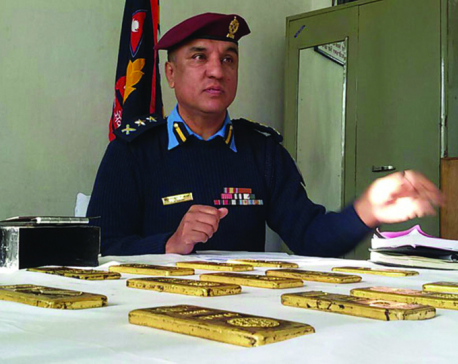
OR
Increased smuggling of raw leather bleeding domestic factories
Published On: October 4, 2016 08:51 AM NPT By: Ritesh Tripathi
BIRGUNJ, Oct 3: The domestic leather industry is facing trouble after the increase in trafficking of raw leather -- the export of which has been restricted -- out of the country.
Some 11 leather factories, with total investment of around Rs 5 billion, are facing difficulty after traffickers started smuggling raw leather to India.
Some seven factories in Birgunj and four in Biratnagar are operating using buying leather of animals killed for meat-consumption purposes.
According to Nepal Leather Industries Association, traffickers have created a serious problem for the leather industry of Nepal.
Kathmandu is the biggest source of raw leather.
Kathmandu produces around 30,000 pieces of raw buffalo leather per month.
According to the Mohammad Junaid, the secretary general of Leather Industry Association, the industry was running okay before and now factories aren’t getting raw leather. He said smuggling had cut the availability of leather and factories were on the verge of closing. This would make 500 people working in the sector unemployed.
According to industrialists, trucks which carry raw leather out from Kathmandu are being driven directly to Kanpur of India through the Rupadiya customs point.
Nepal Training Industries in Biratnagar said it had written a letter on September 8 to the Chief District Office of Banke asking the authorities to step in and stop the trafficking. Banke Chief District Officer Rabi Lal Panta says he doesn’t know anything about the trafficking of raw leather.
Industrialist Javed Navi Iraki says the letter has not even been read by the authorities and illegal export has not decreased.
Leather entrepreneurs send the raw materials on trucks from Kathmandu with paperwork saying it has been dispatched to Birgunj or Biratnagar. However, smugglers pass the leather directly to western Nepal, where there is no leather industry, they say.
Iraki added that the raw material reaches western Nepal’s Nepalgunj and then with help from customs and security officers the raw material reaches Kanpur via the Rupadiya border.
A truck carries around 8,000 pieces of leather. And it has to pay Rs 34 -- Rs 30 as tax and Rs 4 VAT -- in Gurjudhara District Development Committee.
The leather is then sold at Rs 1,600 which. It only costs Rs 1,100.
Customs office data shows that finished leather goods worth Rs 732 million was exported to foreign countries in the last fiscal year, Binod Sharan Acharya, director of the Bureau of Statistics, said.
According to the industry’s umbrella body, Nepali leather goods go to countries like India, China, Vietnam, Italy, Mexico and the United States of America.
“Export will increase if raw material is available. It will also help the country earn foreign currency,” Sanjay Patawari of Global Leather Industries said.
You May Like This

Busting smuggling racket
Combating gold smuggling is a tough job because of strong nexus among smugglers, corrupt leaders, security personnel, bureaucrats and gangsters Read More...

Increased number of permit seekers to scale Mt. Everest
SOLUKHUMBU, April 18: The permit of permission seeker to scale the Mount Everest has increased this year. 365 mountaineers have... Read More...

29 officials suspended in connection with gold smuggling
KATHMANDU, Jan 6: The Department of Customs and Airport Customs Office on Friday suspended as many as 29 officials in... Read More...






Just In
- Challenges Confronting the New Coalition
- NRB introduces cautiously flexible measures to address ongoing slowdown in various economic sectors
- Forced Covid-19 cremations: is it too late for redemption?
- NRB to provide collateral-free loans to foreign employment seekers
- NEB to publish Grade 12 results next week
- Body handover begins; Relatives remain dissatisfied with insurance, compensation amount
- NC defers its plan to join Koshi govt
- NRB to review microfinance loan interest rate











Leave A Comment